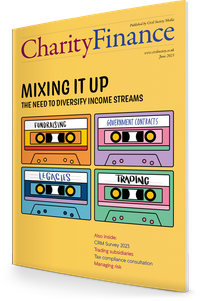We are delighted to announce the return of our ESG Imperative conference.
There is a growing awareness that organisations of all shapes and sizes have a personal accountability to consider their social and environmental footprint and to behave responsibly. But what does this really look like? How many of the reporting frameworks and strategies being adopted in other sectors are transferable to charities?
From navigating the complex world of responsible investment, through to developing net zero targets and tackling the complexities of reporting and good governance, there is a myriad of practical and ethical decisions facing today’s leaders. Our broad range of speakers will offer practical insight and advice, demonstrating the importance and urgency of the ESG agenda, and leaving you better equipped to take meaningful action. We hope you will join us for what promises to be an inspiring, practical and thought-leading conference.
Programme
21 February 2024
-
8.45AM - 9.20AMRegistration, refreshments, networking and time to visit exhibition
-
9.20AM - 9.25AMWelcome from Tristan Blythe, editor, Charity Finance
-
9.25AM - 10.05AMOpening keynote: The Polycrisis Paradox: How responsible charities can make a difference
Join us for an energising keynote with Ed Gillespie, author, serial entrepreneur and futurist, who will consider what it means to be a responsible charity and the collective potential of our sector. Ed will address the current state of the nation, navigating the complex omnishambles we find ourselves in, and offer insights as to why we are in this predicament. Together, we will discover the power of asking the right questions rather than seeking immediate solutions, and explore possible ways to guide ourselves out of trouble towards a more responsible and impactful future.
Ed Gillespie, director, Greenpeace UK and chief futurist, Global Destination Sustainability Movement
-
10.05AM - 10.45AM1A. Cutting the rope in the sustainability versus profitability tug of war
Headlines often frame the energy transition and maximising profitability as competing goals. However, we believe that, in the majority of cases, optimising energy transition strategies can also help to maximise long-term returns for companies. We believe our new engagement-led investing approach complements traditional ESG strategies and aims to drive real-world change alongside unlocking significant return potential for investors. This session will cover the latest innovations in this space and how they might fit within charities’ wider responsible investing strategies.
Nick Stansbury, head of climate solutions, Legal and General Investment Management
-
10.05AM - 10.45AM1B. Telling your charity’s ESG story
Charities are at different stages of their ESG journey. Whether your charity is just starting out or already making strides, it is important to be able to communicate with key stakeholders how you are navigating this important area. This session aims to provide practical advice in shaping your charity’s narrative across the different facets of the ESG agenda, as well as sharing good practice examples from the charity sector and beyond - including what might be on the horizon.
Daniel Chan, director, PwC UK
-
10.45AM - 11.15AMMorning coffee and networking
-
11.15AM - 12.00PM2A. Fuelling positive change – using the collective power of charity investments to tackle the climate crisis
In this session, we delve into the heart of NCVO’s ‘Fuelling Positive Change’ campaign, a transformative initiative urging charities to reconsider their investment in fossil fuels. With fossil fuels accounting for a significant portion of global greenhouse gas emissions, this campaign stands as a rallying call against the unsustainable practices that contribute to climate change and social inequalities. Our speakers share their own experiences of campaigning for and embracing divestment: from understanding the importance of supporting a fossil-free economy, through to the practicalities and process involved with divesting, and advice for gaining board buy-in.
Chair – Muireann Montague, senior campaigns officer, NCVO
Panellists – Tessa Khan, founder and executive director, Uplift and Paul Parker, recording clerk, Quakers in Britain -
11.15AM - 12.00PM2B. Surviving the squeeze - the critical role of real living wages in charities
While environmental, social and governance issues have become increasingly important to the organisational agenda, not all three elements receive equal attention. In this session, we focus on the ‘S’ - essentially a charity’s obligations to treat its workers well. In an ongoing cost-of-living crisis, offering staff the security of a real Living Wage, and the stability of Living Hours has become more important than ever. In making such a commitment, organisations are also tackling poverty, making the charity sector more diverse, and contributing to a wider ESG mission. Join us to learn more about the Living Wage movement, and what practical steps you can take to overcome some of the barriers to implementing it, in order to maximise the potential of your workforce.
Emily Hodgson, Head of Partnerships and Campaigns, Living Wage Foundation and Garry Smith, CEO, Medaille Trust
-
12.00PM - 12.40PM3A. Making ESG more than a buzzword: How to integrate ESG into your investment policy
The session focuses on how charities can effectively incorporate ESG (Environmental, Social and Governance) and stewardship expectations and requirements into their investment policy. Attendees will gain insights into the importance of ESG and stewardship in investment decision-making, the benefits of incorporating these factors into investment policies, and how charities can navigate the challenges of implementing these requirements.
Tom Holbrook, investment director and Nicola Toyer, head of investments, Investec Wealth & Investment (UK)
-
12.00PM - 12.40PM3B. Meeting the mandate for climate action: Public expectations and practical responses
While the sector waits for official guidance on net zero strategies and ESG reporting requirements, recent research demonstrates that public expectation on charities to be active is rising, including the need for even non-environmental charities to be playing their part. Is there an opportunity for cross-sector collaboration, where charities could share resources and knowledge in order to move forward together faster while also reducing costs?
Alex Davies, sustainability and ESG lead, Cancer Research UK
-
12.40PM - 1.45PMLunch and time to visit exhibition
-
1.45PM - 2.30PM4A. ESG masterclass: using ESG to drive value
This session will use real life company case studies to demonstrate how ESG can be integrated into financial modelling, with the goal of driving stronger investment returns for charity investors.
Olivia Lewis, charity investment advisor, & Mike Topley, head of sustainable portfolio management, Barclays Private Bank
-
1.45PM - 2.30PM4B. Panel: Building charity boards fit for the future
The composition and strategic focus of any organisation's board is crucial to determining the direction of travel. Without buy-in at the top, and the right balance of voices round the table, it will be extremely difficult to progress ESG initiatives or champion meaningful change. We invite our speakers to consider some of the challenges posed by traditional governance models, and where untapped opportunity might lie in order to remove any existing barriers and create sustainable charities fit for the future.
Chair - Meg Wright, voluntary sector consultant and governance specialist
Panellists - Cathy Lebadou, trustee, Refugee Action, Ri Chakraborty and Leon Ward, chief executive, MyBnk -
2.30PM - 3.10PM5A. Climate Confident: Charity investments and net zero
This session will cover the findings from Cazenove Capital’s latest research which highlights a groundswell of concern and action by charities around climate change. 76% of the survey respondents believe that charities should be making commitments to act on climate change, however only 54% have made a commitment to date. Our research has shown that many charities are looking for more guidance on how to incorporate their climate ambitions into their investment strategy. This session will provide practical examples of climate related investment policies and outline the actionable steps in order for you to take the next step.
Tom Montagu-Pollock, co-head of charities and Emily Petersen, portfolio director & sustainability lead, Cazenove Capital -
2.30PM - 3.10PM5B. Breathing easier - Asthma + Lung UK case study
Every journey begins with taking a single step and no matter how small, any positive action is better than inaction. This session will share some insights and inspiration from Asthma + Lung UK who are positioning themselves as leaders in the battle for cleaner air. Alongside their advocacy and campaigning work, they have turned the lens inward on their own operations to ensure they are walking the walk. Learn how they have halved their CO2 emissions through moving away from fossil fuels in investments and pensions, and what's next on their continued journey to sustainability.
Ben Clarkson, chief operating officer, Asthma + Lung UK
-
3.10PM - 3.30PMAfternoon coffee and networking
-
3.30PM - 4.25PMFrom the director's chair - leading and developing responsible organisations in turbulent times
In an era of permacrises, running any organisation comes with many pressures. Charity leaders in particular are under more scrutiny than ever to deliver their mission and to meet the needs of both internal and external stakeholders. In addition, economic insecurity and an escalating climate crisis continues to impact the fabric of society and our planet. What role do charities have to play in all of this and should organisations consider changing their strategy to ensure sustainability in the long term? We ask our panel what being a responsible organisation looks like to them, and what kind of leadership is needed to navigate the challenges currently facing our sector.
Chair - Ian Allsop, contributing editor, Charity Finance magazine
Panellists - Enver Solomon, chief executive, Refugee Council, Paul Farmer, chief executive, Age UK and Farah Nazeer, chief executive, Women’s Aid -
4.25PM - 4.30PMChair's closing remarks
-
4.30PM - 5.30PMNetworking reception
What is ESG?

First produced in June's issue of Charity Finance
While social care charities are, by definition, providing a solution to a social issue, like the rest of the charity sector many are increasingly aware of wider environmental, social and governance (ESG) issues too.
ESG reporting is becoming an important focus for many charities, but the exact definition of the term remains relatively unclear. It can be helpful to consider what each of the letters in this acronym means.
- Environmental: the narrative around the environmental aspect has become associated with climate change, net-zero carbon emissions, and the energy transition, and could arguably be broadened to include wider social and physical aspects of the environment, such as dignity and wellbeing, or biodiversity and conservation.
- Social: social encompasses ethical behaviour and practices towards staff and beneficiaries, and the wider contribution to the sustainability of the socio-economic framework.
- Governance: governance encompasses control and direction, with a focus on the way a charity sets out to address risks and opportunities.
ESG as an opportunity for charities
ESG reporting provides an opportunity to tell a charity’s story about its part in the movement towards a sustainable future. Meaningful, authentic ESG reporting can be moulded around each charity’s ethos and values. The other spectrum of ESG has been the initiatives driven by the passions of the charity’s beneficiaries and staff alike to create eco-initiatives and lead on new policies. Reporting on ESG, rather than being a tick-box exercise, could be an opportunity to evaluate what more can be done.
Increasing public benefit
Another consideration for ESG reporting is the work charities do regarding public benefit reporting. In England and Wales, trustees must confirm that they have applied the Charity Commission’s guidance on public benefit. Public benefit is seen to be part of the social aspect of ESG. When thinking about how to include the governance aspect within reporting, the Charities SORP provides guidance to those preparing charity accounts.
While the SORP does not expressly consider ESG reporting, aspects of its existing requirements do coincide with elements of ESG. Similarly, the Charity Governance Code (2020) encourages elements of ESG.
How can charities report on ESG?
There has been a noticeable drive towards greener activity, meaning ESG has climbed up the agenda. Currently, there is no watchdog or regulator offering support for organisations adapting their practices to become more sustainable. This makes it difficult for many charities to see how they can implement ESG reporting practically and in a meaningful way.
The Charity Commission has previously engaged with ESG reporting and the guidance is typically supportive of sustainability being incorporated into the charity’s approach, provided it aligns or is complementary to, the charity’s overall objectives. The two are also linked, with ethical considerations having a positive effect on public trust. The SORP Committee identified sustainability reporting as part of their discussions for developing the SORP.
Further hurdles
While there are lessons to be learned from current corporate reporting, they are by no means always best practice. More weight needs to be placed on the social and governance aspects of ESG, rather than the current focus on the environmental one. The nature of many charities means that ESG can be inherent, but consideration still needs to be given to issues such as employment and safeguarding.
As well as the resourcing issue, ESG reporting might create challenges around who takes responsibility for collecting the information. If reporting lies within the annual report, finance teams could already be struggling for capacity, so charities may need to consider which system would work best for them.
Looking forward
There are currently three options available to charities:
- Do something new.
- Imitate existing reporting.
- Let sleeping dogs lie.
However, keeping an eye on future plans and the impact on the wider community is key.
Importantly, we need to stress that charities are already likely to be doing more than they think and it is a matter of teasing out the relevant aspects for reporting. The way this is communicated, whether through websites or annual reports, is also an important consideration.
Lee Stokes is partner and head of care & community at haysmacintyre
Prices
Great ways to save!
- Be an early bird!
Book your place now to save up to £150 off the ticket price. - Attend with your team!
Ensure your whole team benefits from a great day's learning. With the Charity Team Ticket you can send up to four people
| Ticket type | Early-bird (before 26 January) | Final release tickets (after 26 January) | |
| Charity Finance subscriber rate | £79 | £149 | |
| Charity delegate | £99 | £169 | |
| Charity team ticket (up to four places) **Limited quantity available** |
£249 | £460 |
Contact
For sponsorship and exhibition queries contact Yvette Micallef
For speaker queries contact our events team
For registration queries contact Carys Pugh
For media partnerships and marketing queries contact Kirsty Brown
Signpost to extra ESG resources

|
ESG and economic uncertaintyInvestec’s 2022 charities conference considered how the new era of economic uncertainty might change the emphasis within ESG investing. Ian Allsop reports. |
Toby Ross: ESG and impact
How has charity reporting evolved in recent years
Simon Hopkins: adding our weight to the goal of net zero
James Dow: ESG investing can drive resilience, logevity and growth

|
Pushing ESG up the charity agendaNick Sladden and Carys Tetlaw review recent research on charities’ approach to recording and reporting ESG issues and how they can improve standards. |
Sophie Ward: The rise of 'S' in ESG
Charities should challenge corporations on social issues, says think tank
Charities can attract donations by strengthening ESG practices, say consultant
Terms & Conditions
- Payment
- Registrations will not be fully confirmed until correct payment is received. If you have any issues with payment, please contact [email protected]
- Programming
- Please note that speakers and topics were confirmed at the time of publishing, however, circumstances beyond the control of the organisers may necessitate substitutions, alterations or cancellations of the speakers and/or topics. As such Civil Society Media Ltd reserves the right to alter or modify the advertised speakers and/or topics if necessary. Any substitutions or alterations will be updated on our web page as soon as possible.
- Event attendance
- Delegates are required to observe and comply with all laws, regulations, rules and requirements relating to COVID-19 and which Civil Society Media has adopted as part of its operations. Civil Society Media will communicate the COVID-19 Measures to you from time to time including and without limitation via pre-Event emails, its social channels and the event website
- Civil Society Media reserves the right to alter or remove its COVID-19 Measures at any time in response to the latest guidance or legislation from the UK Government or as otherwise deemed necessary by Civil Society Media in its discretion.
- Civil Society Media reserves the right to eject you or refuse you entry from the event if, in our reasonable opinion, you are refusing to comply with any COVID-19 Measures without reasonable grounds.
- Cancellation or reimbursement
- On receipt of your booking form, your place is confirmed. Delegate substitutions are allowed. Refunds on cancellations will only be issued (less a 15% administration charge) up to and including 30 days prior to the event. Refunds will not be issued after this date. Confirmation of cancellations MUST be in writing and sent to [email protected]
- Individual registrants who registered as part of a discounted group registration are not eligible for refunds, unless the entire group cancels. Registrations may be transferred to another person from the same organisation at any time.
- Postponement or Cancellation of the Event by the Organiser
- Should we have to cancel or postpone due to COVID-19 we will endeavour to give you as much notice as is reasonably possible.
- In the event that we have to postpone this event due to COVID-19, we will transfer your ticket to the next alternative date.





























